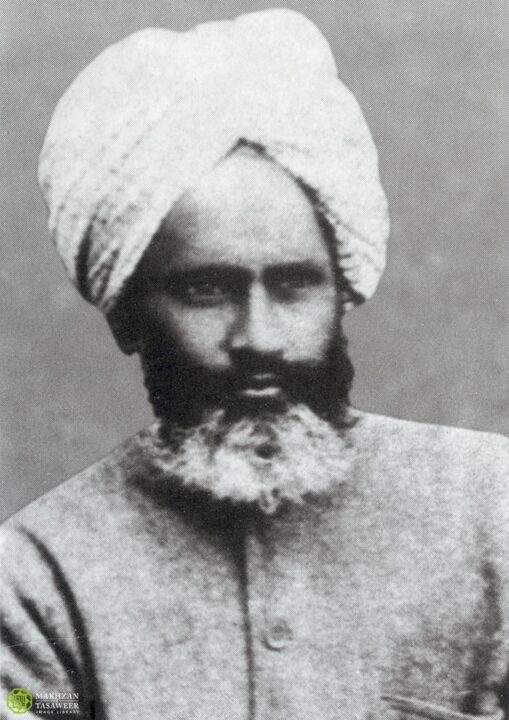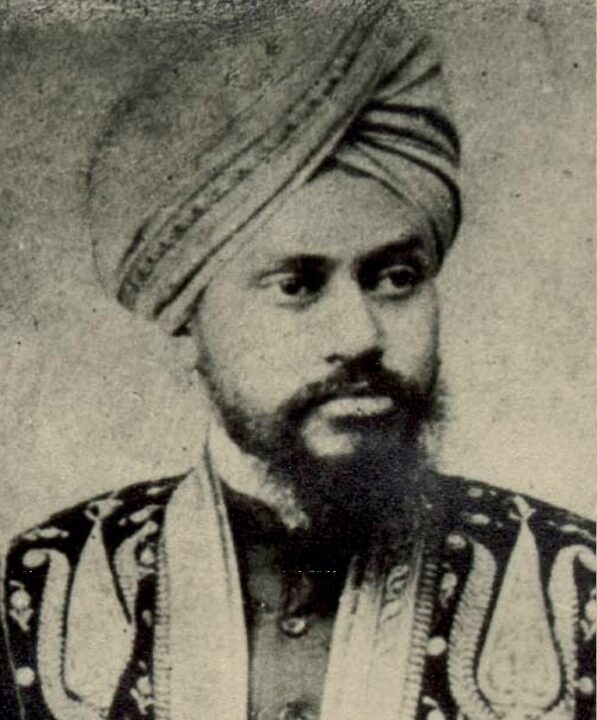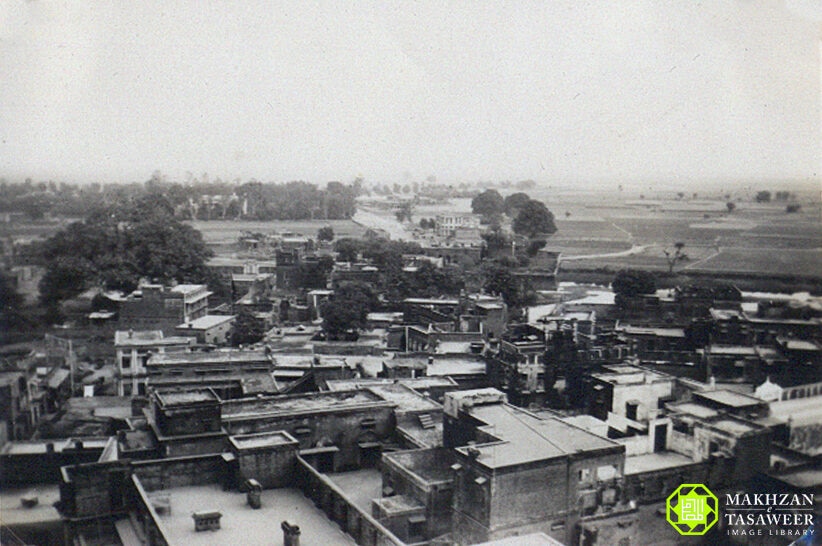In this third year of Al Hakam, we will present a selection of incidents from the blessed life of the Promised Messiahas with some more details
8 January 1904: On this day, Hazrat Nawab Muhammad Ali Khan’sra brother reached Qadian. This esteemed guest (senior advisor to the state of Malerkotla) was provided with the opportunity to enjoy the nearness of the Promised Messiahas. He had the opportunity of having a detailed conversation on this day – a Friday – which sometimes would take the form of questions and answers.
During the sitting, the Promised Messiahas, whilst talking about the etiquette of prayer, explained that some people who are not fully aware of the etiquette of prayer, simply pray and wait impatiently for their prayers to be accepted and eventually, get tired of praying. This method, the Promised Messiahas explained, was incorrect and further said that it is demanded of a person that, upon praying, one must have firm faith in God and faith that they are praying to a Being Who is All-Hearing, All-Seeing, All-Knowing, and Almighty. (Malfuzat, Vol. 3, p. 520)
9 January 1892: The Promised Messiahas replied to a letter he received from Hazrat Munshi Rustam Alira, in which he shared his views about a dream described by Hazrat Munshi Sahibra. Furthermore, Hazrat Ahmadas wrote an address and instructed him to send Hazrat Mir Nasir Nawab’sra belongings to that address in Patiala as he had requested for them to be sent. (Maktubat-e-Ahmad, Vol. 2, p. 582)

9 January 1892: On this day, Hazrat Ahmadas replied to a letter from Hazrat Nawab Muhammad Ali Khanra, acknowledging receipt of 281 rupees he sent and expressed gratitude and further stated that he was in great need of this. Huzooras prayed that Allah the Almighty reward him abundantly for his services in the way of Allah and stated that he had prayed for him fervently during Fajr prayer [on 9 January 1892]. Huzooras said he believed that Allah would accept his prayer and manifest its blessings in any way He desired.

The Promised Messiahas further stated that there was no limit to God’s abilities. He added that it would not be strange if God made the impossible, possible. Hazrat Ahmadas informed him that he would visit Lahore on 20 January 1892 and intended to stay there for 3-4 weeks. (Maktubat-e-Ahmad, Vol. 2, p. 167)
9 January 1902: On this day, the Promised Messiahas replied to a letter he received from Hazrat Seith Ismail Adamra in which he stated that God is most Generous and Merciful. When man faces difficulties in this world, He opens His doors of mercy. Huzooras added that man must have complete faith in Allah and further added that he had also prayed for him. (Maktubat-e-Ahmad, Vol. 3, p. 265)
9 January 1895: On this day, the Promised Messiahas wrote a letter to Hazrat Munshi Rustam Alira, in which he said that there were ample guests who had arrived in Qadian and further stated that there was an extreme scarcity of cooking oil and in its stead, mustard oil was being used for cooking. Huzooras advised him that as he would regularly be sending 20 rupees per month, it would be better for him to purchase and send cooking oil of good quality worth 20 rupees. (Maktubat-e-Ahmad, Vol. 2, p. 608)
10 January 1903: On this day, Maulvi Sanaullah of Amritsar reached Qadian. He was a Muslim cleric and a leading figure within the Ahl-e-Hadith movement. He was also a major antagonist of the Promised Messiahas. He served as the general secretary of Markazi Jamiat Ahl-e-Hadith Hind from 1906 to 1947 and was the editor of Ahle Hadees.
Contrary to allegations levelled against the Promised Messiahas, this maulvi not only rejected the challenge of the Promised Messiahas to a mubahala (prayer duel), but also suggested a principle that liars, deceivers and disobedient people were granted long lives.
Thereupon, God Almighty granted a long life to Maulvi Sanaullah Sahib (1868-1948) according to the principle which he had himself put forward and brought about the death of the Promised Messiahas, thus confirming that according to his own declaration, he was in fact a disorderly and disobedient person, a liar and a deceiver. (Malfuzat, Vol. 2, p. 683)
11 January 1892: On this day, the Promised Messiahas published an ishtihar titled Invitation to the Heavenly Signs, extended to Dr Jagan Nath, Civil Servant in the State of Jammu. Huzooras mentioned that he had received a letter from Hazrat Hakim Maulvi Nuruddinra in which he stated:
“In Izala-e-Auham, Your Holiness wrote with regard to Dr Jagan Nath that he had evaded the challenge. Now Doctor Sahib has said to many people who were in the know of the matter, ‘Wipe out with red ink what was written in black. I never shied away from a challenge, nor did I ask for a specific sign. I never wanted to see the dead brought back to life, nor for a dried up tree to become green. All I wanted was to see any sign which was beyond human power.’”
After being informed of this matter, the Promised Messiahas wrote in his announcement, “I wish to make it clear to my readers that in an earlier letter, Doctor Sahib had asked for specific signs – such as bringing the dead to life etc. In reply, I wrote that it was wrong to ask for specific signs. God Himself manifests signs to suit His intent and purpose. Since a sign is by definition beyond human power, what is the need for specifying it? It is a sufficient test for a sign that human power should fail to produce its like. To this, Doctor Sahib made no reply. Now, he has again expressed a desire to witness a sign and has kindly waved his earlier condition. He now wishes for a sign – any sign – but one which is beyond human power.”
The Promised Messiahas further said that on this date, he had sent him a registered letter inviting him to embrace Islam upon witnessing a sign. Huzooras further stated that he should publish an affidavit in newspapers and state on oath that if he witnessed any sign in support of Islam, he would become Muslim. (Majmua Ishtiharat, Vol. 1, p. 321)
12 January 1878: The Promised Messiahas had subscribed to the following local papers and read them regularly: Safir of Amritsar; Agni Hotri magazine; Hindu Bandu and Manshur-e-Muhammadi.
Hazrat Ahmadas would sometimes send articles to Manshur-e-Muhammadi to be published. On this day, this newspaper published an Urdu poem written by Huzooras.
12 January 1889: Hazrat Mirza Bashiruddin Mahmud Ahmadra was born to Hazrat Mirza Ghulam Ahmadas and Hazrat Nusrat Jehan Begumra on this day in Qadian and in the same year in which the Promised Messiahas established the Ahmadiyya Jamaat in Islam by accepting the allegiance of his disciples. This blessed child was destined to be the promised son, mentioned in prophecies.

12 January 1905: On this day, the Promised Messiahas replied to a letter he received from Hazrat Nawab Muhammad Ali Khanra in which he stated that the problems one faces in this world come as a trial. Huzooras further explained that God’s promise was true and quoted the verse of the Holy Quran ادۡعُوۡنِیۡۤ اَسۡتَجِبۡ لَکُمۡ.
Huzooras further said that change which cannot come about through human efforts can come about through prayer. In order to see the fruits of one’s prayers, it is mandatory that one must remain patient, just as Hazrat Jacobas exhibited an extreme level of patience and eventually witnessed the fulfilment of his prayers. (Maktubat-e-Ahmad, Vol.2, p. 285)
13 January 1886: The Promised Messiahas replied to a letter from Hazrat Munshi Rustam Alira, in which he prayed that Allah granted him happiness. Huzooras informed him that Allah the Almighty disclosed to him the name of the town, Hoshiarpur, where he should stay for a period in seclusion. Huzooras instructed him to not share this with anyone else, as he had not told anyone except a few of his companions. In the end, Huzooras requested him for prayers. (Maktubat-e-Ahmad, Vol. 2, p. 468)
13 January 1892: On this day, the Promised Messiahas wrote a letter to Hazrat Hakim Maulvi Nuruddinra in which he informed him that Khanbahadur John White, who was an educated, wise and knowledgeable young Englishman and was employed in Madras [now Chennai] as a judge, had done Bai‘at.
Hazrat Ahmadas added that the gentleman seemed to be of a jolly nature and upon hearing all beliefs, he replied by saying اٰمَنَّا اٰمَنَّا “We have believed; we have believed” and further said that the Muslims and maulvis who opposed the Promised Messiahas were not only the opponents of the Messiah, but were in fact the enemies of Islam.
Huzooras further instructed Hazrat Hakim Maulvi Nuruddinra to remain in contact with the gentleman. (Maktubat-e-Ahmad, Vol. 2, p. 131-132)
14 January 1897: On this day, the Promised Messiahas published an ishtihar titled al-Ishtiharu Mustaiqinan bi-Wahyillahil-Qahhar, in which he wrote, “I am anxious every moment for the Christians and us to somehow come to a settlement. My heart is rent asunder because of the mischief caused by the worship of a dead man … I would have expired long ago under the burden of this grief had not my Lord, the Strong and Powerful, comforted me with the assurance that in the end, God’s Unity would be victorious. Other gods will be destroyed and false gods will be cut off from their godheads.”
The Promised Messiahas further wrote, “The time is near when all religions will perish except Islam. All weapons will be broken except the heavenly weapon of Islam, for it will neither be broken, nor will it be blunted till it has broken all Antichrist tendencies to bits. The time is near that the true Unity of God, which is perceived within their nature even by those who dwell in the desert or are completely unaware of any teaching, will spread through all regions. On that day there will remain no artificial atonement nor an artificial god. A single stroke of God will frustrate all the plans of disbelief, not by any sword, nor by any gun, but by bestowing light on eager souls and by illumining the pure hearts. Then will there be an understanding of all that which I say.”
At the end of this announcement, the Promised Messiahas stated that his book, Anjam-e-Atham, was printed and available for those who desired to read it. (Majmua-e-Ishtiharat, Vol. 2, p. 182)

